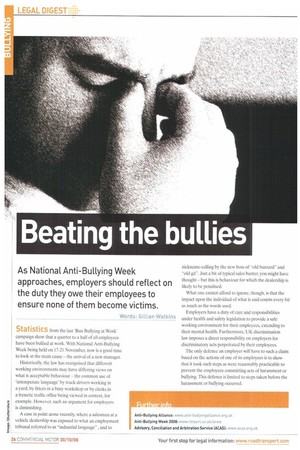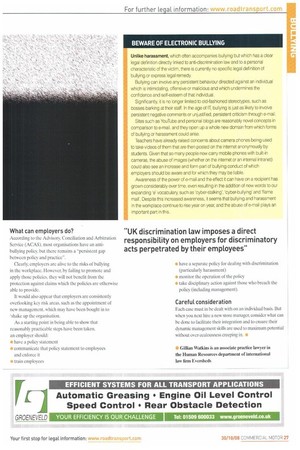As National Anti-Bullying Week approaches, employers should reflect on the
Page 26

Page 27

If you've noticed an error in this article please click here to report it so we can fix it.
duty they owe their employees to ensure none of them become victims.
Words: Gillian Watkins Statistics from the last 'Ban Bullying at Work' campaign show that a quarter to a half of all employees have been bullied at work. With National Anti-Bullying Week being held on 17-21 November, now is a good time to look at the main cause — the arrival of a new manager.
Historically, the law has recognised that different working environments may have differing views on what is acceptable behaviour — the common use of 'intemperate language' by truck drivers working in a yard, by litters in a busy workshop or by clerks in a frenetic traffic office being viewed in context, for example. However, such an argument for employers is diminishing.
A case in point arose recently, where a salesman at a vehicle dealership was exposed to what an employment tribunal referred to as "industrial language" , and to nickname-calling by the new boss of "old buzzard" and "old git". Just a bit of typical sales banter, you might have thought — but this is behaviour for which the dealership is likely to be penalised.
What one cannot afford to ignore, though, is that the impact upon the individual of what is said counts every bit as much as the words used.
Employers have a duty of care and responsibilities under health and safety legislation to provide a safe working environment for their employees, extending to their mental health. Furthermore, UK discrimination law imposes a direct responsibility on employers for discriminatory acts perpetrated by their employees.
The only defence an employer will have to such a claim based on the actions of one of its employees is to show that it took such steps as were reasonably practicable to prevent the employees committing acts of harassment or bullying. This defence is limited to steps taken before the harassment or bullying occurred.
What can employers do?
According to the Advisory, Conciliation and Arbitration Service (ACAS). most organisations have an antibullying policy, but there remains a "persistent gap between policy and practice".
Clearly, employers are alive to the risks of bullying in the workplace. However, by failing to promote and apply those policies, they will not benefit from the protection against claims which the policies are otherwise able to provide.
It would also appear that employers are consistently overlooking key risk areas. such as the appointment of new management. which may have been bought in to 'shake up the organisation.
As a starting point in being able to show that reasonably practicable steps have been taken. an employer should: • have a policy statement • communicate that policy statement to employees and enforce it • train employees




































































































































































